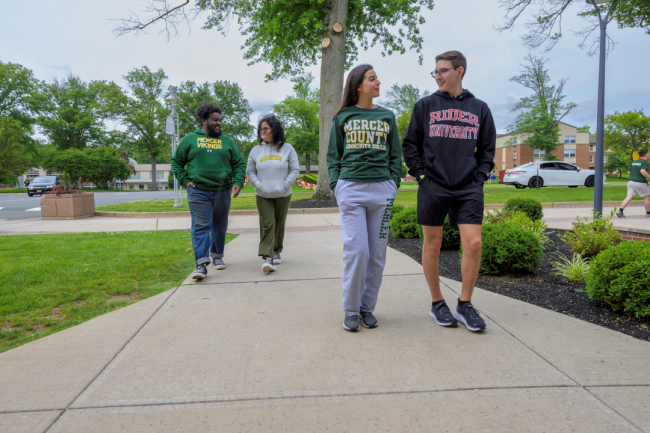You have /5 articles left.
Sign up for a free account or log in.

Rider University signed a three-year agreement with Mercer County Community College that will, starting this fall, allow MCCC students to live in Rider residence halls at a discounted rate.
Rider University
Starting this fall, learners at Mercer County Community College in New Jersey can experience residential living on a college campus, thanks to a new partnership with Rider University.
The two institutions signed an initial three-year agreement in June to provide housing and dining to current and incoming MCCC students on Rider’s Lawrenceville campus at a discounted rate, as well as transportation between the two campuses, located about 17 miles apart.
Community colleges have offered different solutions for residential living for years, but rising rates of housing insecurity among learners have made the need more blatant since the pandemic, prompting additional two-year institutions to add housing.
In 2021, fellow New Jersey institutions Centenary University and Sussex County Community College created a partnership for football players to live in Centenary's dorms.
“Through this new partnership, students have the option to begin their educational career at MCCC and their residential campus experience at Rider with the opportunity to have a smooth transition to Rider to complete their bachelor’s degree through guaranteed transfer agreements,” says Mike Reca, Rider’s vice president for facilities and university operations.
The deal: MCCC students will pay $4,250 per semester for standard double housing, almost $1,000 cheaper than the standard Rider rate. The university will also offer extended-stay plans for nontraditional students at $4,580 per semester.
The university does not see the discounted rate as revenue lost but rather a solution to help fill otherwise-empty beds and increase meal plan purchases, Reca says.
Initially, Rider allocated 20 to 30 beds for MCCC students, and they’ll be distributed among the residence halls based on availability, Reca says. The university hopes to place MCCC students together, but they may live with Rider students, depending on demand.
If a student chooses to transfer to Rider after completing an associate degree, the university will honor the discounted housing rates for an additional two years.
MCCC’s residential students will have access to university facilities, including the library, fitness center, food and dining venues, student health center, and on-campus parking—plus a free shuttle service between the campuses. Students will also receive a Rider ID so they can participate in campus events.
The meal plan option is offered at the same rate to MCCC and Rider students.
The impact: Basic needs insecurity continues to be a barrier for community college students in their academic success.
A spring 2021 national survey from the Center for Community College Student Engagement found 27 percent of respondents had trouble paying rent or their mortgage in full, and 28 percent were unable to pay their utility bills. In total, around 14 percent of respondents had low or very low housing security within 12 months of their responses.
Community college students who live in Rider residence halls may be eligible for additional financial assistance and support due to room and board costs, according to the MCCC website.
By living in the residence halls, MCCC students are integrated into Rider’s campus community prior to transferring, which could promote retention.
If your student success program has a unique feature or twist, we’d like to know about it. Click here to submit.
This article has been updated to show precedence for community college and university housing partnerships in New Jersey.




